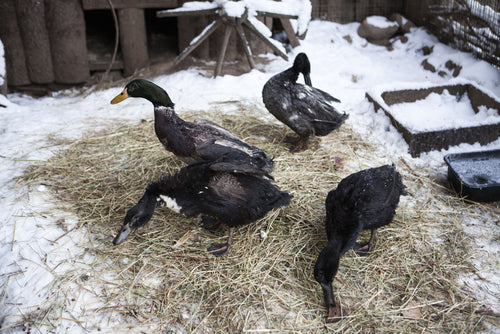
What temperature is too cold for ducks?
Brrr… cold winds, low temperatures, maybe an inch or two of snow. It sounds like a good day to stay indoors! But what about your domestic ducks? Bringing them inside the house isn't likely an option, but you don't want them to suffer from the cold, either. What steps should you take to keep ducks warm? And what temperature is too cold for ducks?

Here's the good news: caring for ducks in cold temperatures isn't too tricky, and the steps required for success are pretty simple. Let's see what's needed.
Cold weather? Try ducks!
First off, it's worth noting that if you're thinking about raising poultry and you live in a climate with chilly winters, ducks can be a fine option. All things being equal, ducks are more cold-hardy than chickens or certain other poultry species. This is because ducks' bodies have a nice layer of cold-resistant fat and multiple layers of feathers for keeping the water out and the heat in. They can also tuck their feet up against their bodies and, unlike chickens, don't have cold-vulnerable combs on the tops of their heads.
How cold is too cold for ducks?
Cold hardy though they may be, ducks have their limitations when it comes to chilly temperatures. A ballpark temperature to keep in mind is 20°F. Once the thermometer drops down that far, your ducks will need some assistance from you to stay comfortable and safe. Incidentally, a duck's average normal body temperature is quite a bit higher than yours — around a whopping 107°F!1
Note: Baby ducks are a different matter entirely. They require a dedicated brooding space and a heated brooder until they grow their mature feathers.
Winter Shelter for Ducks
So then, how do you keep ducks warm in the winter? Because farm animals aren't wild and can't entirely care for themselves, they depend on humans for life's necessities. To help your ducks stay cozy at temperatures even colder than 20°F, you need to provide them with a suitable shelter. (This can be a good idea at night at any time of the year to keep them safe from predators.)
Remember, ducks are more cold-tolerant than chickens, though, so shelter doesn't have to be elaborate.2 A renovated shed, an outgrown playhouse or even an unused chicken coop can work nicely. Preventing wind exposure is a major goal — keeping the drafts down keeps the ducks happy. But the shelter should also be sturdy enough to keep out rain and snow. Even though the shelter is intended to prevent drafts and exposure to the elements, proper ventilation is important. This is because ducks drink a lot of water, resulting in waste with a high moisture content.3 Ducks also exhale a great deal of moisture into the air as they breathe. To keep humidity down in the shelter and prevent mold (which ducks are very sensitive to), plan on installing vents up near the roof of the shelter to allow the moisture to escape.
Keeping Ducks Comfortable
Soft, warm bedding on the floor of the duck shelter is very helpful in keeping the ducks healthy and happy. The basic standbys are straw or fluffy wood shavings (specifically packaged for livestock use). In either case, the bedding creates loose air pockets between the ground and the resting ducks, providing insulating properties that help keep the ducks warm.
Duck Feeders and Waterers
Depending on your specific climate and the duration of cold weather, you may need to increase your ducks' calorie intake to help them withstand the winter. Your local agriculture extension office is great for finding tips tailored to your region.
Fresh water is important for all livestock, but winter introduces the challenge of keeping it ice-free. A basic deicer can help keep a bucket or trough from freezing, but watch out! Ducks love to splash and play with any standing water they can find, so winter might not be the best time to provide them with this type of system. Instead, you could use a heated, no-spill duck waterer to help keep the ducks from splashing water in their bedding where it could freeze.
The weather outside may be frightful, but you can easily keep your ducks warm and delightful. And before you know it, warm spring days will be on the horizon again!
1. ScienceDirect. "Body temperature, heart rate and respiration rate of an unrestrained domestic mallard duck, anas platyrhynchos domesticus." https://www.sciencedirect.com/science/article/abs/pii/S0300962976800643
2. Laatsch, David R. University of Wisconsin-Madison Livestock Division of Extension. “Care of Ducks." https://livestock.extension.wisc.edu/articles/care-of-ducks/
3. Cornell University College of Veterinary Medicine. “Duck Housing and Management." https://www.vet.cornell.edu/animal-health-diagnostic-center/programs/duck-research-lab/housing-and-management


Leave a comment